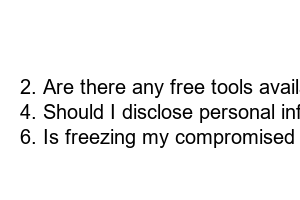개인 정보 유출 확인
Title: Confirm Personal Information Leakage: Protecting Your Online Identity
Introduction:
With the growing dependence on digital platforms, the importance of protecting personal information has become more critical than ever. Online scams and cyberattacks have made it increasingly necessary to confirm the safety of our personal data. This blog post will provide you with valuable insights into confirming personal information leakage and safeguarding your online identity.
1. Understanding Personal Information Leakage:
Personal information leakage refers to the unauthorized access or disclosure of sensitive data, such as name, address, social security number, and financial details. This breach of privacy can have severe consequences, including identity theft, fraudulent activities, and damage to one’s reputation.
2. Recognizing the Warning Signs:
Look out for concerning activities such as unexpected account withdrawals, unknown charges on credit card bills, or sudden changes in credit scores. **Remain vigilant** and take immediate action if you notice any suspicious activities associated with your personal information.
3. Identifying Possible Sources of Information Leakage:
Personal information can be leaked through various sources, including:
– Data breaches: When hackers gain unauthorized access to databases containing personal details of individuals, resulting in significant data leaks.
– Phishing scams: Fraudulent attempts to obtain personal information by posing as legitimate organizations through emails, messages, or fake websites.
– Social media vulnerabilities: Sharing personal information on social media platforms without proper privacy settings can expose sensitive data to a wider audience.
– Weak passwords: Using easily guessable passwords or reusing them across multiple accounts can increase the risk of personal information leakage.
4. Taking Preventive Measures:
To minimize the risk of personal information leakage, it is crucial to adopt good cybersecurity practices:
– Use strong, unique passwords for each online account, combining upper and lower-case letters, numbers, and special characters.
– Enable two-factor authentication whenever possible to add an extra layer of security.
– Regularly update your device’s operating system, apps, and software to protect against known vulnerabilities.
– Be cautious while sharing personal information online and always review privacy settings on social media platforms.
– Avoid clicking on suspicious links or downloading attachments from unfamiliar sources.
5. Confirming the Safety of Personal Information:
Take proactive steps to confirm the safety of your personal information:
– Regularly review financial statements and account activities for any discrepancies or unauthorized transactions.
– Monitor your credit reports to identify any unusual activities or accounts opened without your knowledge.
– Utilize reputable identity theft protection services to stay informed about potential identity risks and receive guidance on appropriate actions to take.
6. Steps to Take in Case of Personal Information Leakage:
In the unfortunate event of personal information leakage, it is crucial to act swiftly:
– Contact your financial institution to report any potential fraudulent activity and freeze compromised accounts.
– Change passwords for all online accounts, particularly those associated with sensitive personal information.
– File a complaint with the appropriate authorities, such as the Federal Trade Commission (FTC), to initiate an investigation and receive guidance on potential legal remedies.
Summary:
Confirming personal information leakage is paramount in safeguarding our online identity. By recognizing warning signs, identifying potential sources of leakage, and adopting preventive measures, we can minimize the risk of falling victim to online scams. Regularly monitoring account activities, staying informed about identity theft protection services, and knowing the steps to take in case of a breach, empower us to secure our personal information effectively. Stay vigilant and prioritize your online safety at all times.
FAQs:
1. What should I do if I suspect personal information leakage?
2. Are there any free tools available to check if my personal information has been compromised?
3. How often should I change my passwords?
4. Should I disclose personal information on social media platforms?
5. Can identity theft protection services provide 100% security?
6. Is freezing my compromised accounts enough to protect my personal information?

